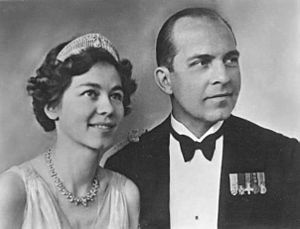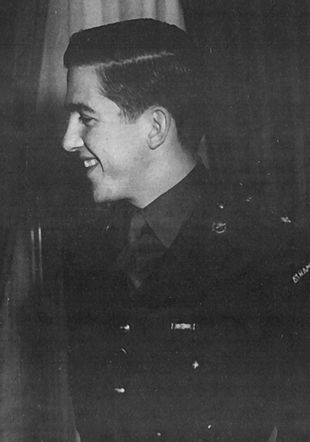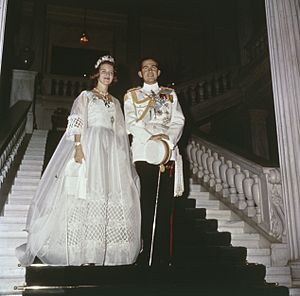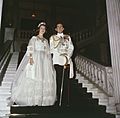Constantine II of Greece facts for kids
Quick facts for kids Constantine II |
|
|---|---|
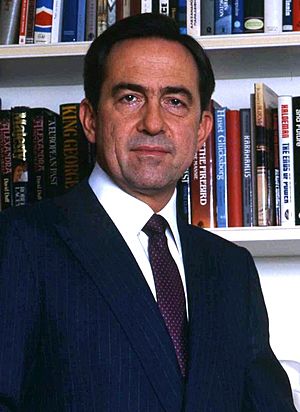
Constantine II in 1987
|
|
| King of the Hellenes | |
| Reign | 6 March 1964 – 1 June 1973 |
| Predecessor | Paul |
| Successor | Monarchy abolished |
| Prime Ministers |
See list
Georgios Papandreou
Georgios Athanasiadis-Novas Ilias Tsirimokos Stefanos Stefanopoulos Ioannis Paraskevopoulos Panagiotis Kanellopoulos Konstantinos Kollias Georgios Papadopoulos |
| Head of the Royal House of Greece | |
| Tenure | 1 June 1973 – 10 January 2023 |
| Successor | Pavlos |
| Born | 2 June 1940 Athens, Kingdom of Greece |
| Died | 10 January 2023 (aged 82) Athens, Greece |
| Spouse | |
| Issue |
|
| House | Glücksburg |
| Father | Paul of Greece |
| Mother | Frederica of Hanover |
| Religion | Greek Orthodox |
| Military career | |
| Allegiance | Kingdom of Greece |
| Service/ |
|
| Rank | Stratarches Stolarches Aitherarches |
Constantine II (Greek: Κωνσταντίνος Βʹ, Konstantínos II; born June 2, 1940 – died January 10, 2023) was the last King of Greece. He ruled from March 6, 1964, until the Greek monarchy was ended on June 1, 1973.
Constantine was the only son of King Paul and Queen Frederica of Greece. He spent his early childhood in Egypt and South Africa because his family had to leave Greece during World War II. They returned to Greece in 1946 during the Greek Civil War. When King George II died in 1947, Constantine's father became king, and Constantine became the crown prince.
He became king in 1964 after his father, King Paul, passed away. Later that year, he married Princess Anne-Marie of Denmark. They had five children together. His time as king was marked by political problems, which led to a military takeover in 1967. Constantine had little power as the head of state because he couldn't rely on loyal military forces. He reluctantly agreed to let the military government take over, but only if it included civilian ministers.
In December 1967, Constantine tried to overthrow the military government, but it failed. He was forced to leave Greece. He remained the official head of state from abroad until the military government ended the monarchy in 1973. A public vote in 1973 confirmed this change. Another vote was held in 1974 after democracy returned to Greece. This vote also confirmed that Greece would be a republic, not a monarchy. Constantine accepted the results, even though he was not allowed to return to Greece to campaign.
Constantine was also a talented sailor and an Olympian. He won a gold medal in sailing at the 1960 Rome Olympics. He later became a member of the International Olympic Committee.
Contents
Early Life and Royal Family
Constantine was born on June 2, 1940, in Psychiko, a suburb of Athens. He was the nephew of King George II. His father, Crown Prince Paul, was the king's younger brother and the next in line to the throne. His mother was Princess Frederica of Hanover. The birth of a male heir to the throne was a big event for the Greek royal family. It was celebrated with a 101-gun salute in Athens. He was named Constantine after his grandfather, Constantine I.
Constantine had an older sister, Princess Sofia, born in 1938. She later became the Queen of Spain when she married Juan Carlos I of Spain. He also had a younger sister, Princess Irene, born in 1942.
Constantine was only a few months old when World War II began. In April 1941, his family had to leave Greece and go to Crete to escape the German invasion. Soon after, they were evacuated from Crete to Egypt. Constantine and his family spent four years living in Egypt and Cape Town, South Africa. They returned to Greece in 1946. When King George II died in 1947, Constantine's father became king, and Constantine became the crown prince.
Becoming Crown Prince and Olympic Success
Constantine went to school at Victoria College in Alexandria, Egypt. He studied alongside King Hussein of Jordan and actor Omar Sharif. He was known as a good student and athlete.
He served in all three parts of the Hellenic Armed Forces (army, navy, and air force). He also took law courses at the University of Athens.
| Medal record | ||
|---|---|---|
| Men's sailing | ||
| Representing |
||
| Olympic Games | ||
| Gold | 1960 Rome | Dragon |
Constantine was a very good sportsman. In 1960, when he was 20, he won an Olympic gold medal in sailing (in the Dragon class). This was the first Greek gold medal in sailing since the 1912 Olympics. He was also a strong swimmer and had a black belt in karate. He enjoyed squash, track events, and horse riding. In 1963, Constantine became a member of the International Olympic Committee (IOC). He later became an Honorary IOC Member.
Constantine's Reign as King
In 1964, Constantine's father, King Paul I, became very ill with stomach cancer. Constantine was made regent to rule in his father's place while he recovered. However, King Paul's health got worse, and he died on March 6, 1964. The 23-year-old Constantine then became King of the Hellenes, known as Constantine II.
Because he was young, many people hoped he would bring positive change to Greece. The country was still recovering from the Greek Civil War (1944–49) and was divided between those who supported the monarchy and those who supported more liberal ideas. Constantine became king at the same time that George Papandreou, a centrist leader, was elected prime minister. People hoped the new young king and the new prime minister could work together to heal the country's divisions.
However, political problems continued. After Prime Minister Papandreou resigned, Constantine appointed new governments that struggled to gain support in Parliament. This led to a period of instability with many changes in government.
The Military Takeover (Junta) and Exile
Elections were planned for May 28, 1967. But a group of army officers, led by Colonel George Papadopoulos, took action first. They staged a military takeover on April 21, 1967. The coup leaders met Constantine at his home, which was surrounded by tanks. Constantine argued with the officers and at first refused their demands. Later, he agreed to let the new military government take power, but only if it included some civilian politicians. He chose Konstantinos Kollias as prime minister. Some people urged the king to use his power as commander-in-chief of the military to stop the coup, but Constantine reportedly refused because he feared bloodshed.
Constantine's relationship with the military government was difficult. He tried to organize a counter-coup on December 13, 1967. He flew to the northern city of Kavala, hoping to gather loyal troops. The air force and navy, which supported the king, mobilized. However, pro-junta officers quickly took control of their units. Realizing his plan had failed, Constantine fled Greece on the royal plane with his family and the prime minister. They landed in Rome on December 14, where they lived in exile. He never returned to Greece as a reigning king.
Constantine continued to see himself as the rightful King of the Hellenes. He believed the military government was afraid of the Crown because it united the people. While Constantine was abroad, Colonel George Papadopoulos became prime minister and General George Zoitakis became regent (ruling in the king's place).
The military government tried to negotiate with Constantine about his return. But Constantine insisted that democracy be fully restored. In June 1973, Papadopoulos declared Greece a republic, ending the monarchy. This decision was confirmed by a public vote, which many believed was unfair. Papadopoulos then declared himself president.
Return to Democracy and the Referendum
In July 1974, the military government fell. Konstantinos Karamanlis, a former prime minister, returned from exile to lead the country. Constantine hoped to be invited back to Greece. He welcomed the end of the dictatorship.
However, Karamanlis decided to hold a new public vote on December 8, 1974, to decide if Greece should bring back the monarchy or remain a republic. Constantine was not allowed to return to Greece to campaign for the monarchy. He could only speak to the Greek people from London on television. Many believed this was done to make it harder for the monarchy to return.
Most people voted for a republic. Many on the left side of politics felt Constantine had interfered too much in politics. Centrist voters also blamed him for allowing the military government to take power in 1967. Constantine admitted his past mistakes and promised to be a democratic king if he returned. But the vote was clear: almost 69% voted against the monarchy and for a republic.
Life in Exile and Later Years
Constantine lived in exile for 40 years after the vote. He was not encouraged to return to Greece. He only came back for a few hours in February 1981 to attend his mother's funeral at the family cemetery in Tatoi.
He had legal disagreements with the Greek government over his property. In 1992, he made an agreement to give most of his land in Greece to a charity. In return, he would get the former palace of Tatoi and could take some personal items out of Greece. However, in 1994, a new law took away his property and his Greek citizenship.
Constantine sued Greece at the European Court of Human Rights. He asked for a large amount of money for his seized property. He won a smaller amount, receiving €12 million. He used this money to create the Anna Maria Foundation, which helps the Greek people with natural disasters and other charitable causes. The court also said that Greece did not violate his human rights by requiring him to adopt a surname to get Greek citizenship.
Constantine often said that he accepted Greece as a republic. He believed that if the Greek people wanted a republic, they should have it. For many years, Constantine and Anne-Marie lived in London. Constantine was a close friend of his cousin Charles III and a godfather to William, Prince of Wales. He sold his London home in 2013.
In 2004, Constantine returned to Greece temporarily for the Athens Olympic Games as a member of the International Olympic Committee. He also visited the Presidential Mansion in Athens, which used to be the Royal Palace.
In 2013, Constantine moved back to Greece permanently. He and his wife bought a home in Porto Cheli, Peloponnese. They later moved to Athens in 2022.
Constantine had several health problems in his final years. He died on January 10, 2023, at the age of 82, after being hospitalized for a stroke.
Marriage and Children
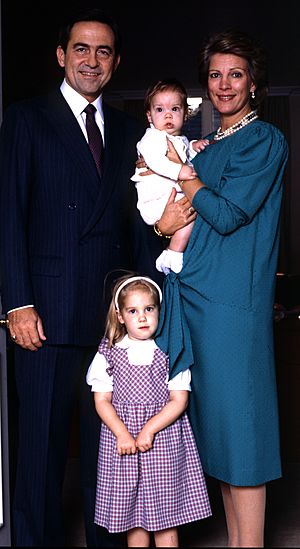
On September 18, 1964, Constantine married Princess Anne-Marie of Denmark in a Greek Orthodox ceremony in Athens.
Constantine and Anne-Marie had five children:
- Princess Alexia, born on July 10, 1965, in Corfu. She married Carlos Morales Quintana in 1999 and they have four children.
- Crown Prince Pavlos, born on May 20, 1967, in Athens. He married Marie-Chantal Miller in 1995 and they have five children.
- Prince Nikolaos, born on October 1, 1969, in Rome. He married Tatiana Elinka Blatnik in 2010.
- Princess Theodora, born on June 9, 1983, in London. She is an actress.
- Prince Philippos, born on April 26, 1986, in London. He works in finance. He married Nina Nastassja Flohr in 2020.
Titles and Honours
Constantine's official Greek passport used to identify him as "Constantine, former King of the Hellenes." However, a law in 1994 removed his Greek citizenship and passport. The law stated he could not get a Greek passport unless he adopted a surname. Constantine said his family did not have a surname, as the Danish royal family (from whom his family originated) also does not use one. He explained that "Glücksburg" was the name of a town, not a family name.
Constantine traveled using a Danish passport as Constantino de Grecia (Spanish for 'Constantine of Greece'). This is because Denmark issues diplomatic passports to descendants of King Christian IX, and Constantine was a Prince of Denmark.
The International Olympic Committee continued to call him His Majesty King Constantine. In Greece, he was often called "the former king." His official website lists his proper title as King Constantine, former King of the Hellenes.
Foreign Honours
 Denmark: Knight of the Order of the Elephant
Denmark: Knight of the Order of the Elephant Egypt: Grand Cordon of the Order of the Nile
Egypt: Grand Cordon of the Order of the Nile France: Grand Cross of the Order of the Legion of Honour
France: Grand Cross of the Order of the Legion of Honour Iranian Imperial Family: Recipient of the Commemorative Medal of the 2,500 year celebration of the Persian Empire
Iranian Imperial Family: Recipient of the Commemorative Medal of the 2,500 year celebration of the Persian Empire Italy: Knight Grand Cross with Collar of the Order of Merit of the Italian Republic
Italy: Knight Grand Cross with Collar of the Order of Merit of the Italian Republic Luxembourg: Knight of the Order of the Gold Lion of the House of Nassau
Luxembourg: Knight of the Order of the Gold Lion of the House of Nassau Jordan: Grand Cordon of the Supreme Order of the Renaissance
Jordan: Grand Cordon of the Supreme Order of the Renaissance Mexico: Collar of the Order of the Aztec Eagle
Mexico: Collar of the Order of the Aztec Eagle Monaco: Grand Officer of the Order of Saint-Charles
Monaco: Grand Officer of the Order of Saint-Charles Netherlands: Grand Cross of the Order of the House of Orange
Netherlands: Grand Cross of the Order of the House of Orange Norway: Grand Cross with Collar of the Order of St Olav
Norway: Grand Cross with Collar of the Order of St Olav Senegal: Grand Cross of the National Order of the Lion
Senegal: Grand Cross of the National Order of the Lion Spain: 1, 176th Knight of the Spanish Order of the Golden Fleece
Spain: 1, 176th Knight of the Spanish Order of the Golden Fleece Sweden: Knight of the Order of the Seraphim
Sweden: Knight of the Order of the Seraphim Thailand: Knight of the Order of the Royal House of Chakri
Thailand: Knight of the Order of the Royal House of Chakri United States: Commander of the Legion of Merit
United States: Commander of the Legion of Merit
Awards
- Greek Scout Association Silver Phoenix Award (1959)
- Scout Association of Japan Golden Pheasant Award (1964)
- International Sailing Federation Beppe Croce Trophy (2010)
Images for kids
-
Prince Constantine's parents Prince Paul and Princess Frederica in 1939
-
Constantine and his wife with their youngest children, Theodora and Philippos, by Allan Warren c. 1986
See also
 In Spanish: Constantino II de Grecia para niños
In Spanish: Constantino II de Grecia para niños
- Timeline of Greek history
- History of modern Greece
- List of Olympic medalists in sailing § Dragon class
- Round Square


